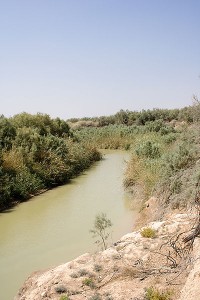Just as he came up out of the … what? – by Rev. Alex Bisset
Spirited Reflection – Readings for January 13, 2014
The Rev. Alex Bisset is minister of Riverdale and Westminster Presbyterian Churches in Toronto, Ontario. Among his many roles in the church, he is currently serving as Moderator of the Presbytery of East Toronto. In a former lifetime, he worked as a lexicographer with Oxford University Press Canada.
“And when Jesus had been baptized, just as he came up from the water, suddenly the heavens were opened to him and he saw the Spirit of God descending like a dove and alighting on him.” Matthew 3:16 (NRSV)
A few weeks ago, on a frigid winter night, I stopped at my local grocery store. The cashier asked how I was. I said I was good, but it was chilly tonight. “Yep,” she said, “chilly and cold out there. Just like the River Jordan.”
The depictions of the Jordan River as “deep and wide” or “chilly and cold” are more theological than geographical. I would not recommend relying on the lyrics of “Michael, row your boat ashore” as a guidebook to the Jordan River valley. The river was almost certainly never as deep or as wide or as crystal clear as it is in our imaginations.
But it certainly used to be far bigger and cleaner than it is today. Environmental groups estimate that, between them, Israel, Jordan and Syria are removing some 98% of the river’s water, reducing it to a tiny fraction of its former flow. Tensions between these three nations, as well as the nation of Palestine, have prevented any agreement to restore the river, and the current conflict in Syria makes multinational movement even less likely. Pilgrims and tourists who step into what water there is are risking their health, for the river has been heavily polluted. Perhaps we need to write some newer, and more accurate, words for the old song. How about, “River Jordan is muddy and brown”? Or maybe, “Michael, row your boat aground?”
There are many good reasons for working to restore the Jordan River. First among these, of course, would be to ensure equal access by all people in the region to the life-giving water it carries. The deplorable state of the Dead Sea, of which the Jordan is the major tributary, is also a reason to take care of the river.
But on this first Sunday after the Epiphany, a day on which many Christians commemorate the baptism of Jesus, there is surely another reason to work for restoration of this particular river. The gospels tell us that Jesus was baptized by John in the Jordan, and that it was when Jesus was coming up out of the water that he saw the Spirit descending on him in the form of a dove, and the heavens were opened to him. Some of the gospel traditions even say that God’s voice was heard that day as well, booming out to claim Jesus as God’s son. Undoubtedly, this could all have happened without the waters of the Jordan. But it didn’t. It happened while the water of the Jordan was still dripping off of Jesus’ body, and rejoining the river.
And it seems to me that if we take seriously the words of Isaiah, that God is the one “who created the heavens and stretched them out, who spread out the earth and what comes from it, who gives breath to the people upon it and spirit to those who walk in it” (Isaiah 42:5 (NRSV), and if we believe that the God who gives us the Spirit is the one who spread out the earth and poured water into the River Jordan, and if this is the God who sent Jesus into the world to live among us, and if this is the God in whose name we were baptized and baptize others, then the work that we must do is even clearer than the waters of the Jordan River ever were.




